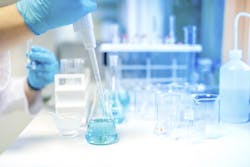Genetically modified cyanobacteria help produce chemicals
Researchers in Germany have developed a technique that uses cyanobacteria as catalysts for photosynthesis-driven chemical reactions.
Professor Dr. Robert Kourist and Dr. Marc Nowaczyk from Ruhr-Universitat Bochum (RUB) are researching resource-efficient, sustainable processes for manufacturing chemical products. They genetically modified cyanobacteria to create cells that produce enzymes for the manufacture of basic and fine chemicals. The bacteria also supply the energy required by the enzymes by performing photosynthesis.
According to RUB, with the new method no external supply of chemical energy is necessary.
To fulfill their function as biocatalysts, enzymes require chemical energy that is typically supplied in form of sugar or other high-energy bonds. Instead, the new process takes advantage of the fact that, like plants, cyanobacteria perform photosynthesis.
“During photosynthesis, light energy is initially converted into chemical energy. In the second step, that energy is mainly used for binding of carbon dioxide. However, a small percentage of the energy remains and can be directly utilized,” Dr. Nowaczyk explained.
The approach adopted by the researchers is to decouple the supplied chemical energy from carbon fixation and to use it directly for chemical reactions.
Using genetically modified living cyanobacteria as catalysts for photosynthesis driven biotransformations is a new approach, RUB said.
A report on the study has been published in the journal Angewandte Chemie.
